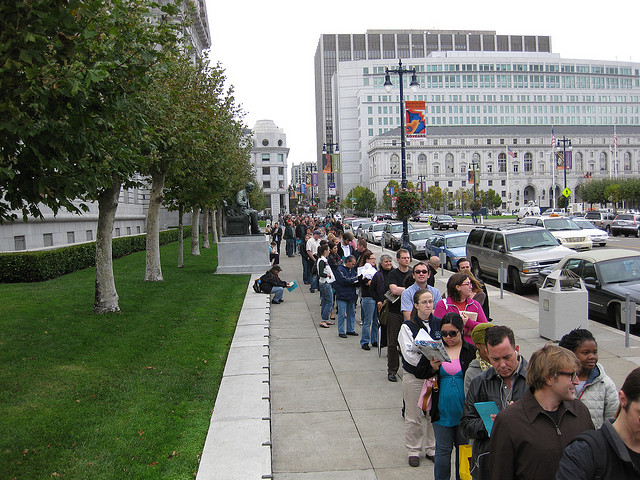 For some people, this year’s journey to the voting booth started years ago, in El Salvador or China or Cameroon, when it became clear that they had to leave their country and start over in America. For those people, (whom U.S. Citizenship and Immigration Services calls “Americans by choice,”) the journey to the polls has involved hardship, struggle, hundreds of hours learning English and civics, and studying for the naturalization test. They bring not only their vote to the polls, but a reminder to all of us that our precious democracy can only succeed when we believe in this country enough to take the time to vote.
For some people, this year’s journey to the voting booth started years ago, in El Salvador or China or Cameroon, when it became clear that they had to leave their country and start over in America. For those people, (whom U.S. Citizenship and Immigration Services calls “Americans by choice,”) the journey to the polls has involved hardship, struggle, hundreds of hours learning English and civics, and studying for the naturalization test. They bring not only their vote to the polls, but a reminder to all of us that our precious democracy can only succeed when we believe in this country enough to take the time to vote.
There are some great stories about the impact of voting on naturalized citizens, who are a growing part of the electorate. For example, a teacher from the Dominican Republic who immigrated to the U.S when she was ten finally chose to become a citizen after visiting one of her immigrant students in a detention center:
“I realized on my train ride back that I’d been taking for granted the fact that I had access to the ultimate goal, the thing that everyone wants, the thing that everyone is working towards, the thing that my mom came here for. That’s when I really got serious about applying,” she said.
And the children of immigrants often value the right to vote just as highly, in part because they sometimes carry the responsibility of voting for their entire family. As one young U.S. citizen explained, when she saw her Salvadoran father studying for his naturalization exam, she became motivated to canvass her neighborhood encouraging fellow Latinos to vote, though she was too young to vote herself. The children of immigrants know that voting represents a critical part of the reason their parents came to the U.S.
“They’re in a sense voting for their parents because their parents can’t vote, and that’s what your parents want you to do, they want you to vote, to do something they can’t do. That’s the whole reason they came to this country — to give their kids a better opportunity. And in a sense in voting, you’re fulfilling their dream basically.”
And then there is Boyd Applegate, a San Diego truck driver who has taken Election Day off nearly every year for the past twenty years to work the polls. He, too, has noticed how special the act of voting is for many immigrants.
“Over the years, I’ve run into many people who are naturalized citizens — they’ve come from all over the world,” he says. “I’ve had people approach me and ask me, ‘How much do I have to pay to cast my ballot?’
“I’ve had people with tears in their eyes, grown people, who are voting for the first time in their life because the country where they come from, they didn’t have that right.”
While still a small percentage of the total electorate, naturalized citizens can make a difference in close elections. According to a recent report from the Center for the Study of Immigrant Integration at the University of Southern California:
“In the 2004 presidential election—the most recent with an incumbent running for reelection—several key states were decided by low margins of victory. For example, the margin of victory in that year was only 2.6 percent in Nevada—a state where 5.1 percent of the voting age citizen population now consists of recently naturalized immigrants. The margins of victory in Florida and Colorado were around 5 percent—and the recently naturalized comprise 6 percent of the voting age citizen population in Florida and 2.1 percent in Colorado.”
Regardless of whether they swing elections or not, the fact that naturalized citizens are voting in increasing numbers bodes well for the future of the country they now call home.
FILED UNDER: Rhetoric, Students


